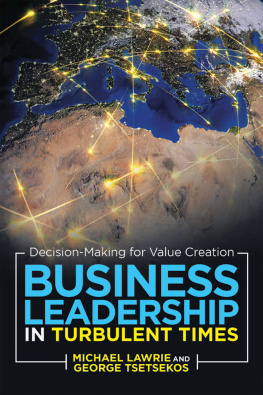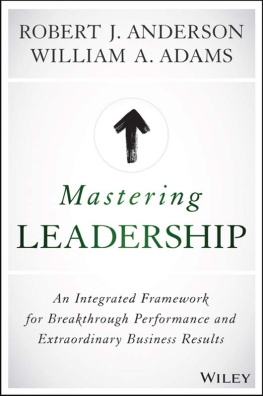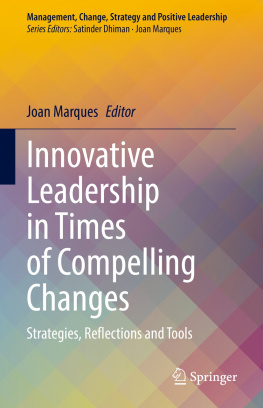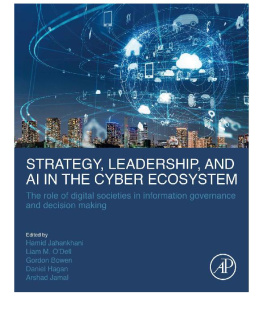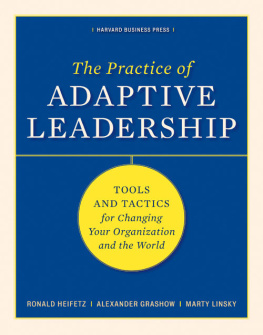STRATEGY AS LEADERSHIP
Facing Adaptive Challenges in Organizations
ROBERTO S. VASSOLO & NATALIA WEISZ
FOREWORD BY
Ron Heifetz & Marty Linsky
STANFORD BUSINESS BOOKS
An Imprint of Stanford University Press
Stanford, California
STANFORD UNIVERSITY PRESS
Stanford, California
2022 by Roberto Santiago Vassolo and Natalia Weisz. All rights reserved.
No part of this book may be reproduced or transmitted in any form or by any means, electronic or mechanical, including photocopying and recording, or in any information storage or retrieval system without the prior written permission of Stanford University Press.
Special discounts for bulk quantities of Stanford Business Books are available to corporations, professional associations, and other organizations. For details and discount information, contact the special sales department of Stanford University Press. Tel: (650) 725-0820, Fax: (650) 725-3457
Printed in the United States of America on acid-free, archival-quality paper
Library of Congress Cataloging-in-Publication Data
Names: Vassolo, Roberto, author. | Weisz, Natalia, author.
Title: Strategy as leadership : facing adaptive challenges in organizations / Roberto S. Vassolo and Natalia Weisz.
Description: Stanford, California : Stanford Business Books, an imprint of Stanford University Press, 2022. |
Includes bibliographical references and index.
Identifiers: LCCN 2021016218 (print) | LCCN 2021016219 (ebook) | ISBN 9781503629134 (cloth) | ISBN 9781503629820 (epub)
Subjects: LCSH: Strategic planning. | Leadership. | Organizational change.
Classification: LCC HD30.28 .V388 2022 (print) | LCC HD30.28 (ebook) | DDC 658.4/012dc23
LC record available at https://lccn.loc.gov/2021016218
LC ebook record available at https://lccn.loc.gov/2021016219
Cover design: Notch Design
Text design: Kevin Barrett Kane
Typeset in 10/15 Spectral
In memory of Arnie C. Cooper and in gratitude to Rodolfo Q. Rivarola, two beloved professors whose example continues to light our way.
CONTENTS
FOREWORD
We are writing this in early 2021. There is optimism in the air and in our hearts. While we know that there will still be difficult days ahead, the availability of multiple vaccines for dealing with COVID-19 gives us reason to believe that the end of the pandemic is within our sights. We have hope that when you are reading this in late 2021 and beyond (because we believe that this book will have value for executive teams and strategy consultancies for decades to come), COVID-19 and robust personal and economic recoveries will be the subject of history and not current realities.
Predictably, we are also beginning to see retrospective examinations of the private and, more significantly, governmental decision-making in early 2020 as the presence and the spread of the virus became more pronounced. There are themes recurring in these narratives that strike a familiar chord with us. First, policy makers, particularly those closest to the world of electoral politics, wanted to believe that the virus was no worse than the annual flu. Second, those who disagreed were often shut out of the key conversations, dismissed as one-note Cassandras. And third, somewhat ironically, the technical people including the scientists, the medical professionals, and the public health experts were those most likely to be advocating for measures that demanded widespread, distributed responsibility and behavioral change. These changes would range from annoying (masks, social distancing, and repeated hand washing) to extremely disruptive (like shutting down most of the economy and schools) to the daily lives of millions of people. They were not saying, We can solve this. Leave it to us experts, as experts often do. To the contrary, their message from very early on was that, in order to control the pandemic and limit its human devastation and economic impact, people everywhere had to agree to take steps that they were perfectly capable of doing but that would create significant inconveniences and challenging discontinuities in their habits and behaviors.
Not surprisingly, and not coincidentally, some of the most important lessons from the pandemic experience are closely connected to the insights that Natalia Weisz and Roberto Vassolo have captured in these pages you are about to read.
From our experience and observation, the single most common explanation for the failure of leadership comes from trying to treat challenges that are primarily adaptive in nature as if they were technical problems.
Between the two of us, we have been teaching, writing, and consulting about this stumbling block for over sixty years. Our work has taken us from Harvard Kennedy School classrooms to workshops and engagements all over the globe, helping senior authorities across the public, nonprofit, and private sectors address their most difficult strategic and tactical issues.
Nowhere has this difficulty been more present than when corporations try to come to grips with changing circumstancesinternal, external, or both. Ron wrote about this as far back as 1997, in his landmark article in Harvard Business Review called The Work of Leadership, which he coauthored with Donald Laurie.
From our earliest days as colleagues and collaborators, we noticed that organizations tended to fall back on strategic planning processes to address the long-or medium-term need for providing direction, a roadmap for the employees, senior managers, and boards. These initiatives typically use the services of outside firms, sometimes big consultancies with an international footprint, sometimes smaller boutiques who hold themselves out as experts in strategic planning. The scope of work might involve interviews and/or off-site retreats. The large firms often bring in a cadre of talented, young people, often newly minted MBAs, who collect qualitative and quantitative data, which are then assembled, refined, and turned into a lengthy report with a raft of recommendations, sometimes developed with the involvement of more senior members of the consultancy, sometimes not. Once the report is delivered and then presented in an agonizingly long and detailed PowerPoint deck, the consultants work is often done.
What we also noticed was that many of the recommendations were never implemented. Indeed, our impression is that the implementation failure rate of strategy consultancies is upward of 70 percent. Sometimes the whole report is literally put on a shelf, untouched. On many occasions, our small firm, which focused on helping clients tackle their adaptive challenges, was called in afterward to help them figure out why the strategic planning process failed and what they could do about it.
The key insight here is that strategic recommendations are not strategic solutions until they are refined and lived in the hearts, minds, and actions of people.
Natalia and Roberto have traveled a journey similar to ours, from the classroom to consulting and back again, with each realm feeding the other. Natalia is steeped in adaptive leadership, Roberto in strategic management. In their work, they began to see that the two specialties were inextricably linked. With that realization, they went even further than we have done in bringing those worlds together.
Five years ago, in collaboration with other colleagues, they created an executive program with a cohort of several senior teams from different industries, each team bringing to the classroom setting a daunting external or internal organizational challenge. Roberto and Natalia worked with them both as a whole cohort and in small groups, helping them learn how to address their challenges adaptively and pollinating their experiences across organizations so that they could learn from each other as well. The teams worked their own organizational issues, shared their experiences, and benefited from the awareness that they were not alone, that they were not unique in their desire to look for easy solutions to difficult, strategic problems.


